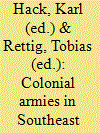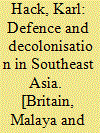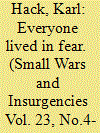|
|
|
Sort Order |
|
|
|
Items / Page
|
|
|
|
|
|
|
| Srl | Item |
| 1 |
ID:
067687


|
|
|
|
|
| Publication |
London, Routledge, 2006.
|
| Description |
xviii, 334p.
|
| Series |
Routledge studies in the modern history of Asia
|
| Standard Number |
0415334136
|
|
|
|
|
|
|
|
|
|
|
|
Copies: C:1/I:0,R:0,Q:0
Circulation
| Accession# | Call# | Current Location | Status | Policy | Location |
| 050653 | 355.0095909034/HAC 050653 | Main | On Shelf | General | |
|
|
|
|
| 2 |
ID:
047069


|
|
|
|
|
| Publication |
Richmond, Curzon Press, 2001.
|
| Description |
xiv, 341p.
|
| Standard Number |
0700713034
|
|
|
|
|
|
|
|
|
|
|
|
Copies: C:1/I:0,R:0,Q:0
Circulation
| Accession# | Call# | Current Location | Status | Policy | Location |
| 044418 | 325.359/HAC 044418 | Main | On Shelf | General | |
|
|
|
|
| 3 |
ID:
116255


|
|
|
|
|
| Publication |
2012.
|
| Summary/Abstract |
Recent research on Palestine, Kenya, and Malaya has emphasised the coercive nature of 'Britain's dirty wars'. Abuses have been detailed and a self-congratulatory Cold War-era account of British counter-insurgency - as 'winning hearts and minds' and using minimum force - subjected to intensifying attack. The result has been a swing from over-sanitised narratives of the primacy of 'winning hearts and minds', towards revisionist accounts of relentless coercion, the narrowly coercive role of the army, and of widespread abuses. This article argues that, if Malaya is anything to go by, the essence of Cold War-era British counter-insurgency victories lay neither in 'winning hearts and minds' per se, nor in disaggregated and highly coercive tactics per se. Rather, it lay in population and spatial control in the which the interaction of both was embedded. In Malaya British tactics during the most critical campaign phases counterpoised punitive and reward aspects of counter-insurgency, in order to persuade people's minds to cooperate, regardless of what hearts felt. This article thus makes the case for avoiding artificial contrasts between 'winning hearts and minds' and a 'coercive' approach, and instead for a new orthodoxy focusing on their roles within the organising framework at play during successful phases of counter-insurgency.
|
|
|
|
|
|
|
|
|
|
|
|
|
|
|
|
| 4 |
ID:
090700


|
|
|
|
|
| Publication |
2009.
|
| Summary/Abstract |
From the 1970s most scholars have rejected the Cold War orthodoxy that the Malayan Emergency (1948-60) was a result of instructions from Moscow, translated into action by the Malayan Communist Party (MCP). They have instead argued that local factors precipitated violence, and that the MCP was relatively unprepared when the Emergency was declared. This article puts the international element back into the picture. It shows that the change from a 'united front' to a 'two camp' international communist line from 1947 played a significant role in deciding local debates in favour of revolt. It also demonstrates how the MCP had plans for a graduated build-up to armed revolt before an Emergency was declared. This article therefore offers a model for a dynamic, two-way relationship between the international and local levels of Cold War.
|
|
|
|
|
|
|
|
|
|
|
|
|
|
|
|
|
|
|
|
|